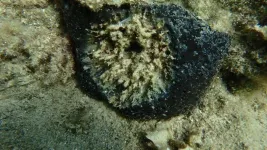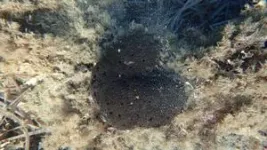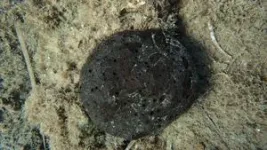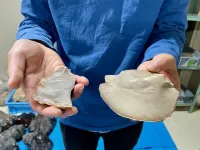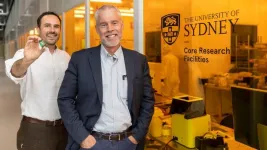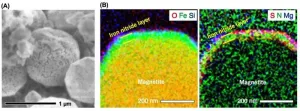(Press-News.org) Vibrio bacteria, named for their vibrating swimming motion, span approximately 150 known species. Most Vibrio live in brackish or salt water, either swimming free or living as pathogens or symbionts in fish, crustaceans, molluscs, and corals. Because Vibrio thrive at relatively high temperatures, outbreaks in marine animals are expected to become ever more frequent under global warming. For example, over the past few decades, Vibrio have been implicated in the ‘bleaching’ of subtropical and tropical corals around the world.
Now, researchers from Spain and Turkey have shown that Vibrio bacteria also play a role in outbreaks of mortality of an unrelated sessile marine organism, the dark stinging sponge (Sarcotragus foetidus). The results are published in Frontiers in Microbiology.
“Here we show that pathogenic Vibrio bacteria were abundant in diseased individuals of the dark stinging sponge, during a deadly outbreak first observed in late 2021 in the Aegean Sea,” said Dr Manuel Maldonado, a senior scientist at the Spanish National Research Council (CEAB-CSIC) and a coauthor of the study.
The dark stinging sponge, first recorded by Aristotle in his books, is widespread in the Mediterranean and North Atlantic, typically living at shallow depths. In the summer of 2021 at Izmir, Turkey, coauthor Dr Fikret Öndes – an associate professor at Izmir Katip Celebi University – first learned of a mysterious disease that affected dark stinging sponges locally.
“When I dived and observed the study area and its surroundings, I encountered not only visibly unhealthy sponges, but also dead ones,” said Öndes. He immediately alerted his colleagues, with whom he undertook to study the novel disease.
Link to warm temperatures
During subsequent dives between August and December, the researchers studied 117 dark stinging sponges off Seferihisar on the Turkish Aegean coast. Each individual was photographed and measured, with tissue samples taken for DNA analysis. The majority (64%) of the sponges seemed healthy, but 27% were visibly affected by partial necrosis, while 9% appeared dying or dead.
From ribosomal RNAs exclusively present in diseased, dying, and dead sponges, the authors detected a total of three Vibrio species: V. fortis, V. owensii, and V. gigantis. These species were previously known to occur in the tissues of corals and diseased crustaceans and shrimp, respectively.
“None of the three pathogenic Vibrio species occurred in all the diseased sponges studied. This may mean that vibriosis is a secondary infection that worsens the course of disease, but isn’t the primary etiological agent. Further research based on the metagenomics of diseased individuals, sampled at several disease stages, is required to resolve this,” said Maldonado.
Consequences for marine ecosystems
That heat-loving Vibrio bacteria play a role in the disease, either as the primary or secondary agent, is borne out by the observation that the disease wasn’t observed later than October. The authors also speculate that the same pathogens may have caused the reported simultaneous mass mortality of shallow-water stony corals in the northern Aegean. Further studies are needed to confirm this.
“Climate change is currently affecting marine ecosystems, including water temperature, and these changes appear to impact disease dynamics in sponges and their pathogens,” said first author Dr Ezgi Dinçtürk from the Department of Aquaculture of Izmir Katip Celebi University.
“Healthy sponges enhance light penetration by clean bacterio- and microphytoplankton from water, take up and release inorganic nutrients, and serve as micro-refuges for a large variety of organisms. Disease outbreaks like this could thus have major consequences for marine ecosystems.”
END
Scientists raise alarm as bacteria are linked to mass death of sea sponges weakened by warming Mediterranean
Vibrio bacteria are important for novel disease in sponges recorded by Aristotle
2023-12-01
ELSE PRESS RELEASES FROM THIS DATE:
Mass General-developed brain care score (BCS) is a scientifically validated way to assess current health habits and risk to future brain health
2023-12-01
BOSTON – Individuals can improve their brain care and reduce their risk of developing brain diseases such as dementia and stroke by focusing on a list of 12 steps covering modifiable physical, lifestyle, and social-emotional components of health.
The list was developed and validated in research published in Frontiers in Neurology by investigators from the McCance Center for Brain Health at Massachusetts General Hospital (MGH) and their collaborators in the United States and Europe.
For the study, the scientists ...
Exercise training improves obesity-related dementia
2023-12-01
Obesity is a major risk factor for cardiovascular metabolic diseases and neurodegenerative diseases such as dementia. Long-term exercise improves memory and spatial cognition, reduces age-related cognitive decline, and maintains brain volume, but the mechanisms are not fully understood.
Recently, a study from Febbraio lab at Monash University reported that voluntary exercise training (VET) improves long-term memory in high-fat diet (HFD)-induced obese mice, increases hippocampal neurogenesis ...
Paleolithic humans may have understood the properties of rocks for making stone tools
2023-12-01
A research group led by the Nagoya University Museum and Graduate School of Environmental Studies in Japan has clarified differences in the physical characteristics of rocks used by early humans during the Paleolithic. They found that humans selected rock for a variety of reasons and not just because of how easy it was to break off. This suggests that early humans had the technical skill to discern the best rock for the tool. The researchers published the results in the Journal of Paleolithic Archaeology.
As Homo sapiens moved from Africa to Eurasia, they used stone tools made of rocks, such as obsidian and flint, to cut, slice, and craft ranged weapons. Because ...
A patch of protection against Zika virus
2023-12-01
A simple-to-apply, needle-free vaccine patch is being developed to protect people from the potentially deadly mosquito-borne Zika virus.
A prototype using The University of Queensland-developed and Vaxxas-commercialised high-density microarray patch (HD-MAP) has delivered a University of Adelaide-developed vaccine and elicited an effective immune response to Zika virus in mice.
UQ alum and Vaxxas researcher Dr Danushka Wijesundara said Zika virus was a risk to people across the Pacific, Southeast Asia, India, Africa and South and Central America.
“We can change the way we combat Zika virus with the ...
ORNL supports executive order for safe, secure and trustworthy AI
2023-12-01
As artificial intelligence technologies improve, they increase the efficiency and capabilities of research across the scientific spectrum. Because of the rapid pace of the field, AI tools must be developed sustainably, a guiding principle for the Department of Energy’s Oak Ridge National Laboratory throughout its 40 years of AI research. Now, its extensive array of resources are supporting the nation as it harnesses the power of these transformative technologies.
In October, President Biden ...
Photonic chip that ‘fits together like Lego’ opens door to semiconductor industry
2023-12-01
Researchers at the University of Sydney Nano Institute have invented a compact silicon semiconductor chip that integrates electronics with photonic, or light, components. The new technology significantly expands radio-frequency (RF) bandwidth and the ability to accurately control information flowing through the unit.
Expanded bandwidth means more information can flow through the chip and the inclusion of photonics allows for advanced filter controls, creating a versatile new semiconductor device.
Researchers expect the chip will have application in advanced radar, ...
Meteorites likely source of nitrogen for early Earth
2023-12-01
Micrometeorites originating from icy celestial bodies in the outer Solar System may be responsible for transporting nitrogen to the near-Earth region in the early days of our solar system. That discovery was published today in Nature Astronomy by an international team of researchers, including University of Hawai'i at Mānoa scientists, led by Kyoto University.
Nitrogen compounds, such as ammonium salts, are abundant in material born in regions far from the sun, but evidence of their transport to Earth's orbital region had been poorly understood.
"Our recent findings suggests the possibility that a greater amount of nitrogen compounds than previously ...
Can artificial intelligence improve life science? As much as life science can improve AI, researchers say
2023-12-01
Artificial intelligence (AI) may attempt to mimic the human brain, but it has yet to fully grasp the complexity of what it means to be human. While it may not truly understand feelings or original creativity, it can help us better understand ourselves — especially our physical bodies in health and in disease, according to a series of articles recently published by the journal Quantitative Biology.
The peer-reviewed papers — a variety of editorials, perspectives and commentaries on AI for life science — assess the rapid development of AI and recent attention ...
CureSHANK seeking RFAs to stimulate research of SHANK3-related epilepsy in Phelan-McDermid syndrome
2023-12-01
CureSHANK will award a total of $250,000 aimed at stimulating research on SHANK3-related epilepsy, prevalent in PMS patients. The grants, CureSHANK Research to Cure Grant: Epilepsy (R2C Epilepsy), will provide targeted funding to support SHANK3-related epilepsy research projects. The awards aim to improve mechanistic and clinical knowledge of SHANK3-related epilepsy.
The PMS community lives under the long shadow of epilepsy: it is responsible for many deaths of both children and young adults with PMS, and it is among the disorder's most distressing symptoms. Nearly one-third of individuals living with PMS are diagnosed with epilepsy, often evolving ...
Eating beans improves gut health, regulates immune and inflammatory processes in colorectal cancer survivors
2023-12-01
HOUSTON ― Incorporating navy beans into the diet of colorectal cancer (CRC) survivors has the potential to positively impact both gut and host health by modulating markers linked to obesity and disease, according to new research from The University of Texas MD Anderson Cancer Center.
The findings published today in eBIOMedicine, part of The Lancet family of journals, revealed BE GONE trial participants who added a cup of navy beans daily to their regular meals saw positive changes in their gut microbiome, which is associated with cancer prevention and improved treatment outcomes. Changes included an increase ...
LAST 30 PRESS RELEASES:
Blood test “clocks” predict when Alzheimer’s symptoms will start
Second pregnancy uniquely alters the female brain
Study shows low-field MRI is feasible for breast screening
Nanodevice produces continuous electricity from evaporation
Call me invasive: New evidence confirms the status of the giant Asian mantis in Europe
Scientists discover a key mechanism regulating how oxytocin is released in the mouse brain
Public and patient involvement in research is a balancing act of power
Scientists discover “bacterial constipation,” a new disease caused by gut-drying bacteria
DGIST identifies “magic blueprint” for converting carbon dioxide into resources through atom-level catalyst design
COVID-19 vaccination during pregnancy may help prevent preeclampsia
Menopausal hormone therapy not linked to increased risk of death
Chronic shortage of family doctors in England, reveals BMJ analysis
Booster jabs reduce the risks of COVID-19 deaths, study finds
Screening increases survival rate for stage IV breast cancer by 60%
ACC announces inaugural fellow for the Thad and Gerry Waites Rural Cardiovascular Research Fellowship
University of Oklahoma researchers develop durable hybrid materials for faster radiation detection
Medicaid disenrollment spikes at age 19, study finds
Turning agricultural waste into advanced materials: Review highlights how torrefaction could power a sustainable carbon future
New study warns emerging pollutants in livestock and aquaculture waste may threaten ecosystems and public health
Integrated rice–aquatic farming systems may hold the key to smarter nitrogen use and lower agricultural emissions
Hope for global banana farming in genetic discovery
Mirror image pheromones help beetles swipe right
Prenatal lead exposure related to worse cognitive function in adults
Research alert: Understanding substance use across the full spectrum of sexual identity
Pekingese, Shih Tzu and Staffordshire Bull Terrier among twelve dog breeds at risk of serious breathing condition
Selected dog breeds with most breathing trouble identified in new study
Interplay of class and gender may influence social judgments differently between cultures
Pollen counts can be predicted by machine learning models using meteorological data with more than 80% accuracy even a week ahead, for both grass and birch tree pollen, which could be key in effective
Rewriting our understanding of early hominin dispersal to Eurasia
Rising simultaneous wildfire risk compromises international firefighting efforts
[Press-News.org] Scientists raise alarm as bacteria are linked to mass death of sea sponges weakened by warming MediterraneanVibrio bacteria are important for novel disease in sponges recorded by Aristotle
